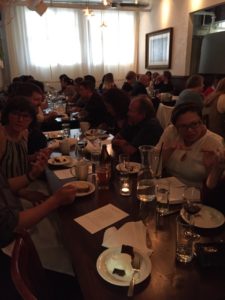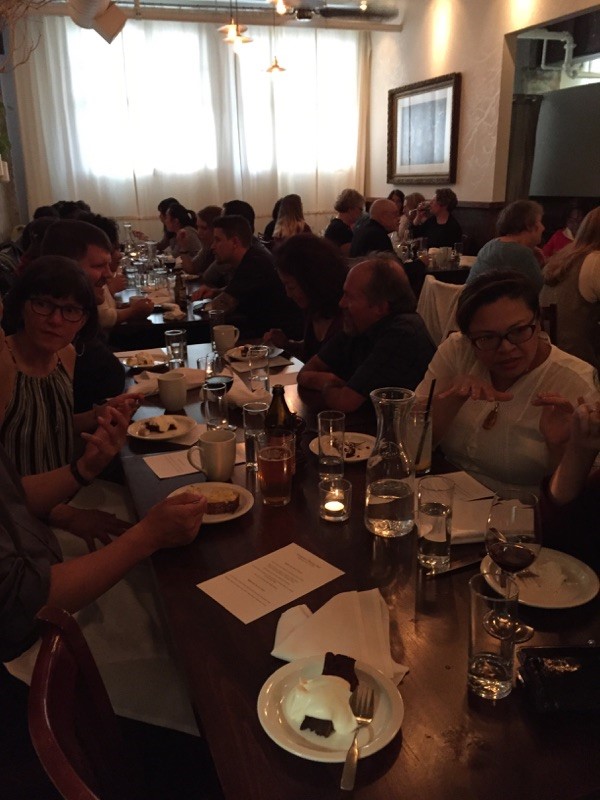 In 2014, the Eastside Pathways Backbone began engaging in the Pacific Educational Group’s (PEG) Courageous Conversations training, a protocol for engaging, sustaining, and deepening interracial dialogue, in an effort to learn more about how to move towards racial equity as a community in Bellevue. Eastside Pathways connected with PEG because the Bellevue School District was already working with them and because of PEG’s commitment to achieving racial equity in education. Their purpose is to partner with educational organizations to assist in addressing racial disparities and transform beliefs and behaviors so people of all races can achieve their highest potential and live empowered lives. Their mission is very much in alignment with Eastside Pathways’ own vision.
In 2014, the Eastside Pathways Backbone began engaging in the Pacific Educational Group’s (PEG) Courageous Conversations training, a protocol for engaging, sustaining, and deepening interracial dialogue, in an effort to learn more about how to move towards racial equity as a community in Bellevue. Eastside Pathways connected with PEG because the Bellevue School District was already working with them and because of PEG’s commitment to achieving racial equity in education. Their purpose is to partner with educational organizations to assist in addressing racial disparities and transform beliefs and behaviors so people of all races can achieve their highest potential and live empowered lives. Their mission is very much in alignment with Eastside Pathways’ own vision.
The last two years have seen not only Eastside Pathways but other community partners embark on the journey.
Stephanie Cherrington and Susan Sullivan, share their latest experiences after the recent regional summit.
Stephanie Cherrington, executive director of Eastside Pathways
“The more I live, the more I learn. The more I learn, the more I realize, the less I know.”
― Michel Legrand
The quote above sums up my feelings after attending the recent Pacific Educational Group (PEG) Regional Summit in Vancouver, WA. I know my journey in learning and leading in racial equity is just that… a journey. A journey in which I continue to be slapped in the face—in a good way—with the reality that I don’t know what I don’t know.
I attended the conference along with dozens of individuals representing various Eastside Pathways partner organizations including the City of Bellevue, Westminster Chapel, Jubilee REACH, the Bellevue School District, PTSA, the Bellevue School Board, SOAR, the League of Education Voters, and Leadership Eastside. We were also joined by members of the City of Kirkland and the Department of Early Learning.
For some, this was their first experience at a PEG conference. I know that can be an emotional experience. Brent Christie from Jubilee REACH offered a moving article of his personal experience a few years ago. I’m lucky in that this was my third trip to the regional conference. Because I’d been before, as I entered into my chosen learning track the first day, Teaching with Racial Relevance, I wondered if this too would be an emotional experience.
I can say, for me, this time around it was not a roller coaster ride of emotions. This, however, did not minimize my learning in any way. In fact, it affirmed for me the importance of the full journey. Our instructor made it very clear that he would not be offering “tips or tricks” but rather providing a structure for a way of teaching or leading in a racially relevant way. We had the opportunity to dive into Critical Race Theory which is the examination of society and culture, including the intersection of race, law, and power. For me, this was definitely a further and important examination of the systems of racial inequality that exist.
With each step in my own personal learning, I find that I am more firmly planted in my belief of how important this work is to ensuring systemic change so ALL children are happy, healthy, and successful. I’m thankful for our partnership and that I get to work and learn with passionate individuals dedicated to systemic changes which benefit all, in particular, the children in our community.
Susan Sullivan, president of the Board of Directors of Eastside Pathways
Not being an educator, I was curious to see how I could apply the lessons from the Pacific Educational Group (PEG) session on Toward Culturally Relevant Teaching.
Two weeks ago I, along with over 30 other people who are part of the Eastside Pathways Partnership and several people from the Washington Department of Early Learning, attended the PEG Regional Summit in Vancouver, WA. For some, it was their first time working with PEG and they examined their personal racial equity experience in the Beyond Diversity I session. Others continued their racial equity work in the Beyond Diversity II. Several people from the Bellevue School District continued their work on the “affiliate” accreditation which will equip them to lead the Beyond Diversity I class themselves.
Culturally responsive teaching isn’t a set of engagement strategies you use on students. Instead, think of it as a mindset, a way of looking at the world. Too often, we focus on only doing something to students without changing ourselves. — Zaretta Hammond
Switching from non-culturally relevant teaching to culturally relevant teaching is not a “light switch” transition. It requires an ongoing reexamination of beliefs and behaviors to be able to change them. – Marcus Moore
What I gained from this two-day session was greater awareness and practice in looking at the world differently. My perspective on race affects the relationships I have with both White people and people of color and is not limited to a classroom. I was introduced to Critical Race Theory which is a paradigm to analyze systemic forces of racism and an instrument for the deconstruction of systemic racism. I learned that the three C’s of race will help me to understand people and how they live race – COLOR, CULTURE (social practices and how they add meaning to events), and CONSCIOUSNESS (awareness of the impact of race on my life). And what I know is that for Bellevue to be a place where all kids are happy, healthy and thriving, I need to intentionally and actively engage in this work every day.
My thanks to Eastside Pathways partners from the City of Bellevue, City of Kirkland, League of Education Voters, Westminster Chapel, Jubilee REACH, SOAR, Leadership Eastside, and Bellevue School District, and the staff from the Department of Early Learning for engaging in courageous conversations on race and advancing the work towards racial equity.

